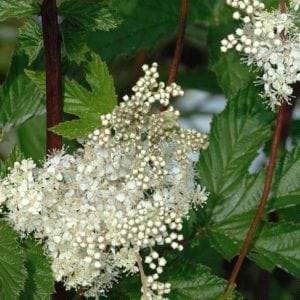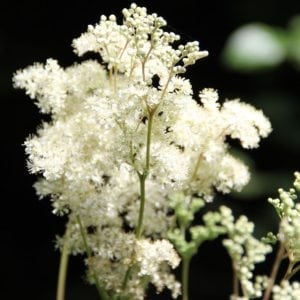Meadowsweet: Herb of the Week
This week’s featured herb is meadowsweet (Filipendula ulmaria)!
A Boon for Braces

Meadowsweet has been one of my best friends on this whole orthodontics experience. It’s so soothing to the irritated insides of my cheeks, I can’t even tell you. It drastically reduces the pain, and noticeably speeds healing. When my braces are really bothering me, I just make a whole press-pot of meadowsweet, and hold each sip in my mouth for a minute or two before swallowing – it’s by far the best thing I’ve found for that pain and irritation!
Other wounds or sores in the mouth will also be astringed and soothed by meadowsweet, so give it a try the next time you have a canker sore or just a good old-fashioned bit-my-own-cheek incident.
Gut Check

Meadowsweet is one of our favorite herbs for pain and irritation in the digestive tract. Heartburn, stomach ulcers, and all kinds of intestinal problems are all improved with meadowsweet’s soothing touch – just like in the mouth from orthodintic irritation.
Exactly just like, actually – it’s all the same actions doing the work. A lot of times the list of “Things An Herb Can Do ™” can start to sound like some kind of magical kitchen sink of unlikely miracle cures. But this is where learning herbal energetics – the old system of understanding how an herb works in the body – and researching what we know of herbal mechanisms of action – the modern system of understanding how an herb works in the body – really pays off.
In the case of meadowsweet and its giant list – ulcers, heart burn, ulcerative colitis, IBS, abrasions in the mouth, leaky gut, etc – it’s because meadowsweet has:
- a nice astringent action to help tighten up areas that have been compromised (think, “torn”),
- a vulnerary action, which means, it stimulates the creation of new cells to heal over old damaged ones,
- an analgesic action, which reduces pain, and
- an anti-inflammatory action.*
* (It’s not the same as taking an ibuprofen, though. It doesn’t shut inflammation down – which is good, because inflammation plays an important role in wound recovery – but it does address the underlying issues, which allows inflammation to subside.)
If you look at those actions, and if we consider that the type of cells that meadowsweet is addressing throughout the digestive tract is fairly uniform, now it makes total sense that it’s so effective. If you have digestive issues that require astringent, wound-healing, pain-relieving, and anti-inflammatory action, meadowsweet’s just the flower for you!
Salute Your Salicylates
Meadowsweet might be familiar to you if you’ve studied any medical history, because it’s one of the plants they used to make asprin from. Meadowsweet has salicylates, which can be used to make salicylic acid, or in other words, asprin. You don’t necessarily need to purchase that form – your liver can do that conversion for you.
It’s actually handy to let your liver do it, because when you drink meadowsweet as tea or take it as tincture, there’s no acid in your stomach – just the salicylates. It doesn’t become an acid until after it’s processed in the liver, so it never causes ulcers!
Of course, meadowsweet tea doesn’t yield as high a concentration as taking straight salicylic acid, but we find that you really don’t need that higher concentration in many cases – again, because meadowsweet has so many helpful angles of approach, you don’t have to rely on a high concentration of only one action.
Parrying Pain
What about when herbal pain management just isn’t enough? It’s still time for meadowsweet!
Some kinds of pain are big enough that we can feel grateful for pharmaceutical pain medication, and when that’s the case, do whatcha gotta do. But NSAIDs and other pharmaceutical pain meds have gut-damaging side effects, and that’s a big bummer.
Fortunately, we don’t have to choose between an “herb that isn’t strong enough for my pain” and a “pharmaceutical that will damage my gut lining” – we can have both! Remember, meadowsweet helps repair gut lining damage. So if you need an ibuprophen, that doesn’t mean you’re not a good herbalist, it means you’re using the tool you need for the situation you’re in. We don’t just ignore the side effects, though – manage them instead with meadowsweet. Toss in some calendula and plantain (two more plants with gut-healing action), maybe a nice bit of ginger to be delicious, and boom: your pain is managed and your guts heal faster.
Want to learn more about herbs that can make your life better? Check out our Materia Medica program – it’s a complete herbal toolkit to keep you healthy and strong!
3 Comments
Leave a Comment
You must be logged in to post a comment.

Join our newsletter for more herby goodness!
Get our newsletter delivered right to your inbox. You'll be first to hear about free mini-courses, podcast episodes, and other goodies about holistic herbalism.



[…] discussed include willow, meadowsweet, jamaican dogwood, feverfew, ginger, chamomile, wild lettuce, ashwagandha, ground ivy, ghost pipe, […]
[…] black cohosh, feverfew, skullcap, passionflower, ginkgo, marshmallow, linden, lemon balm, willow, meadowsweet, wood betony, ginger, chamomile, calamus, […]
[…] discussed include meadowsweet, tulsi, schisandra, chamomile, Irish moss, shiitake & maitake, nettle, rose, & […]